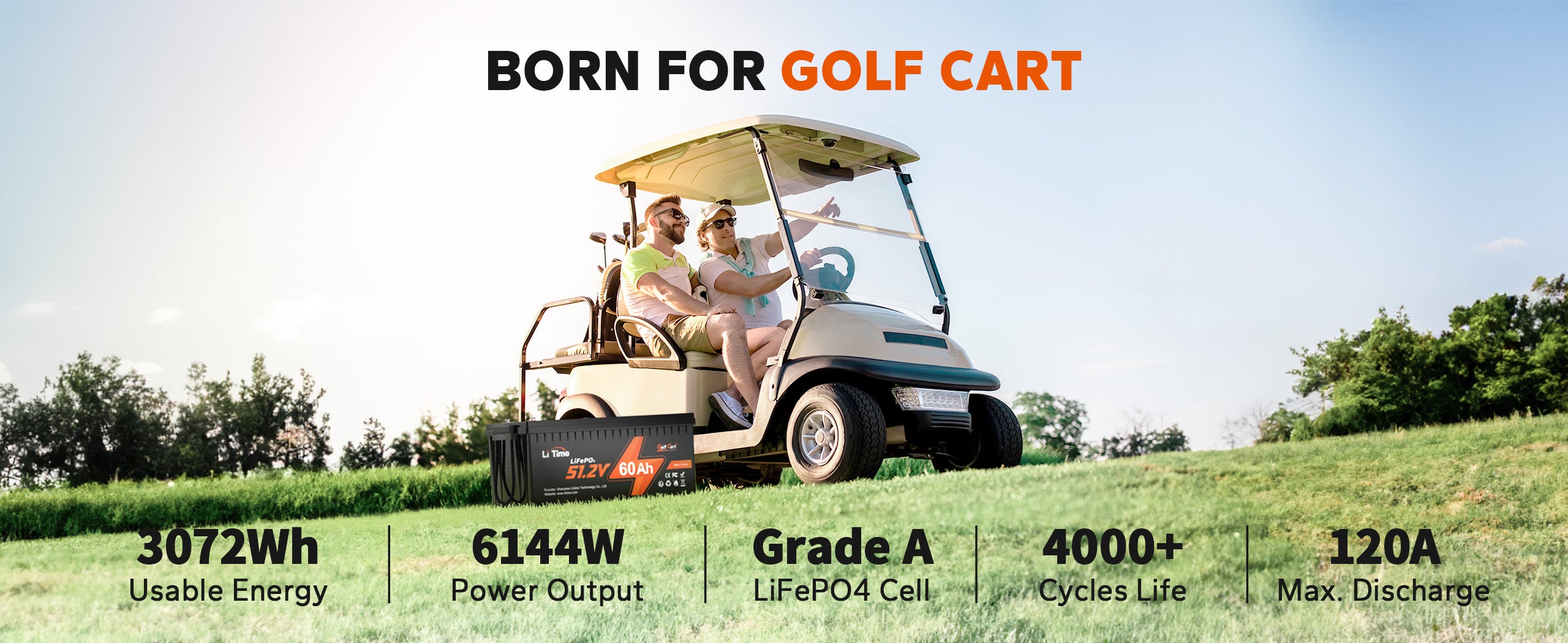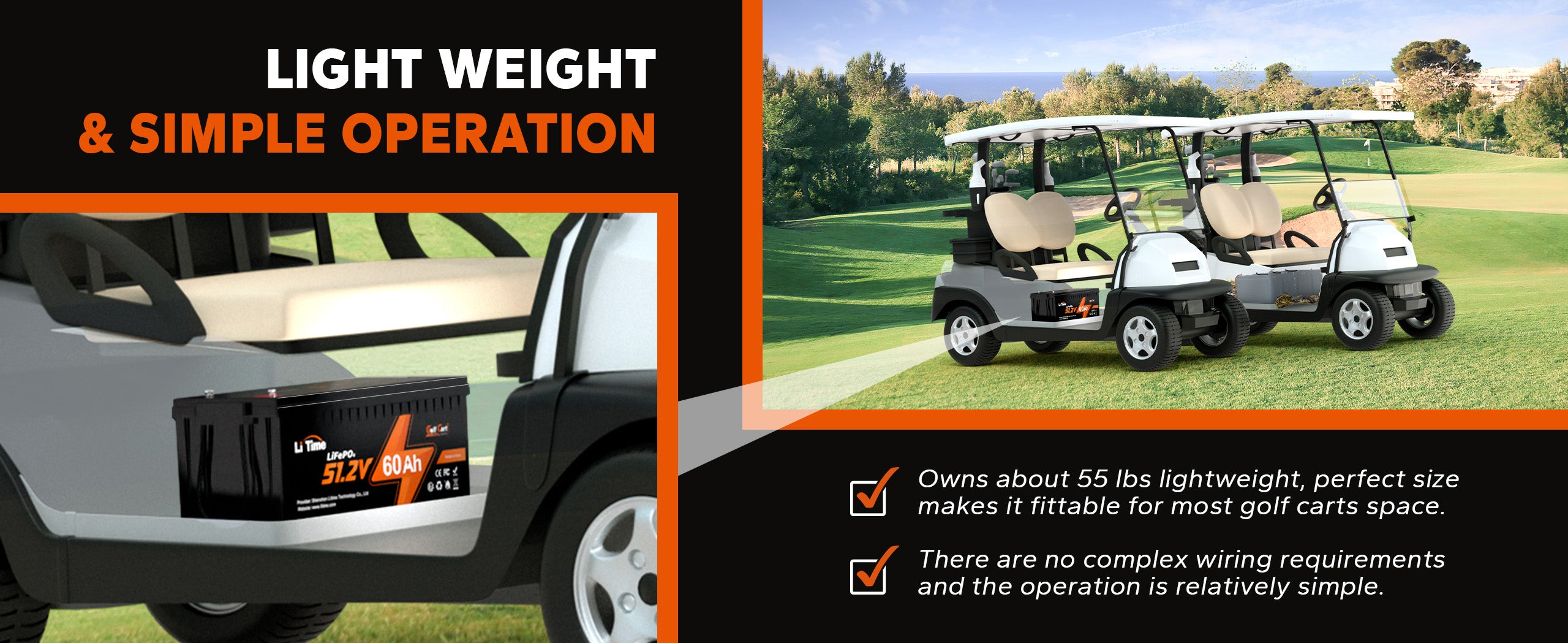If you own an electric golf cart, you're well aware that the batteries are its beating heart. Concerns about the high maintenance and replacement costs of these batteries are common among our customers. However, our goal is to change your perspective by providing you with comprehensive knowledge about golf cart batteries. We want to empower you to make informed purchasing decisions, eliminate your fears about replacement expenses, and help you choose the best battery options when the time comes for a replacement.
What Are Golf Cart Batteries?
Golf cart batteries are deep cycle batteries specifically designed to power electric golf carts. These batteries are typically 6-volt or 8-volt batteries that are connected in series to provide the necessary voltage to power the cart. They are different from automotive batteries because they are designed to provide a steady flow of power over an extended period of time, rather than a burst of power for starting an engine. Golf cart batteries are essential for the operation of electric carts and are often referred to as the "beating heart" of the vehicle.
Electric golf carts typically operate at voltages of 36 or 48 volts, consuming between 50-70 amps of current while cruising at a speed of approximately 15 miles per hour. However, it is important to note that the current draw can increase significantly during acceleration or when navigating uphill terrain. This continuous demand for power necessitates the use of golf cart batteries that can provide a steady and high current flow for extended periods, ensuring that users do not become stranded during their outings.
How Do Golf Cart Batteries Work?
Golf cart batteries work by using a chemical reaction to convert chemical energy into electrical energy. They are typically deep cycle batteries, which means they are designed to provide a steady flow of power over an extended period of time, rather than a burst of power for starting an engine like automotive batteries.
Inside a golf cart battery, there are lead plates submerged in a solution of sulfuric acid called electrolyte. The lead plates are made up of two types: positive plates coated with lead dioxide (PbO2), and negative plates coated with sponge lead (Pb). These plates are arranged in a repeating sequence inside the battery.
When the battery is discharged, the chemical reaction between the lead plates, electrolyte, and sulfuric acid produces lead sulfate (PbSO4). When the battery is charged, the reverse reaction occurs, converting lead sulfate back into its original form of lead dioxide and sponge lead.
These chemical reactions produce electrons that flow through the battery terminals, creating the electrical current needed to power the golf cart.
It's important to note that golf cart batteries require proper maintenance, including regular charging and watering, to ensure their longevity and optimal performance.
In recent years, lithium golf cart batteries are becoming popular. Lithium golf cart batteries work by utilizing lithium-ion technology to store and release electrical energy. Unlike traditional lead-acid batteries, lithium batteries use lithium compounds as the active material in the electrodes.
Inside a lithium battery, there are typically two electrodes—the cathode and the anode—separated by an electrolyte. The cathode is usually made of lithium iron phosphate (LiFePO4), lithium nickel cobalt aluminum oxide (NCA), or lithium nickel manganese cobalt oxide (NMC). The anode is typically made of graphite or silicon-carbon composite.
During normal operation, lithium ions move back and forth between the cathode and the anode during charging and discharging. When charging, lithium ions are extracted from the cathode and inserted into the anode, resulting in the storage of electrical energy. Conversely, during discharging, lithium ions move back to the cathode, releasing stored energy in the form of electrical current.
Types of Golf Cart Battery: Lead-Acid VS LiFePO4
There are four main types of golf cart batteries available:
1.Flooded Lead Acid Batteries
These are the most common and traditional batteries, which require regular maintenance, including filling with water and cleaning. They are still widely used but are being replaced by other options.
2.AGM Lead Acid Batteries
These batteries are similar to flooded lead acid batteries but come at a higher cost without providing significant benefits in terms of power output or charge time.
3.Gel Lead Acid Batteries
Another type of lead acid battery, gel batteries also come at a higher cost but do not offer substantial advantages over flooded lead acid batteries.
4.Lithium-Ion Golf Cart Batteries
The most significant growth in recent years has been in the use of lithium-ion batteries for golf carts. Unlike the lithium batteries used in small devices, golf cart lithium batteries are stable and safe, specifically designed for deep-cycle applications.

They offer several advantages over lead acid batteries:
- Longevity: Lithium-ion batteries can last three to five times longer than lead-acid batteries, providing up to 4,000 charge cycles compared to 1,000 for lead-acid batteries.
- Maintenance-free: Lithium-ion batteries do not require any maintenance, such as watering or cleaning, unlike lead-acid batteries.
- Steady Power Output: The voltage of lithium-ion batteries remains consistent even as the battery is depleted, while lead-acid batteries lose power as they are used.
- Fast Recharge: Recharging lithium-ion batteries is significantly faster compared to lead-acid batteries. They can reach 80% charge in as little as one hour and achieve a full charge in 2-3 hours.
- Lightweight: Lithium-ion batteries weigh only about one-fourth of the weight of lead-acid batteries. This reduces the overall weight of the golf cart, making it more efficient and easier to maneuver.
- Environmental Impact: Lithium-ion batteries produce significantly less harmful waste compared to lead-acid batteries, with a reduction of up to 95% in waste production.
Overall, while flooded lead-acid batteries are still widely used, lithium-ion batteries offer longer lifespan, faster recharge times, lower weight, and reduced environmental impact, making them an increasingly popular choice for golf cart owners.

Lithium Golf Cart Battery Recommended
LiTime 48V 60Ah Golf Cart LiFePO4 Battery with a powerful 120A BMS and an impressive energy capacity of 3072Wh. This lithium iron phosphate (LiFePO4) battery is specifically designed for golf cart applications, offering exceptional performance and longevity. With its advanced battery management system (BMS), it ensures optimal charging and discharging, maximizing the lifespan and efficiency of the battery.
Features of LiTime 48V 60Ah Lithium Golf Cart
【Advanced Golf Cart Performance】
The LiTime 48V 60Ah Golf Cart LiFePO4 Lithium Battery is specifically designed for golf carts, offering exceptional performance and enhanced capabilities. Equipped with a 120A BMS and supporting a maximum 2C rate discharging current, this battery is a perfect drop-in replacement for AGM batteries in golf carts. It is also suitable for a range of low-speed power vehicles, such as club carts, electric shuttle buses, street-legal carts, and electric trike scooters operating at speeds below 21 mph (35 km/h). With its enormous 3072Wh energy capacity, enjoy double the runtime and extended freedom on and off the green.
【Lightweight & Easy Installation】
Weighing only 1/4 the weight of a set of lead-acid golf cart batteries, the LiTime battery is a game-changer. Shed over 200 lbs from your cart effortlessly. The reduced weight translates to improved maneuverability, increased speed, and better handling on the golf course. The battery's perfect size ensures a seamless fit in most golf carts, and installation is a breeze with no complex wiring requirements.

【Exceptional Lifespan】
The LiTime battery features 2C Rate super Grade A level cells crafted with high-quality materials. These cells undergo rigorous testing to ensure superior performance and durability. With over 4000 deep cycles, this battery provides carts with enhanced power for a longer duration. Additionally, its extremely low self-discharge rate preserves its charge during periods of inactivity, ensuring excellent long-term performance and reliability as a trusted energy storage solution.
【Versatile Applications】
Beyond golf carts, the LiTime 48V 60Ah LiFePO4 Lithium Battery finds versatile applications. It can be used in electric vehicles, recreational vehicles, boathouses, trolling motors, and home backup power supplies. Unlike lead-acid batteries, the LiFePO4 battery maintains a flat voltage curve, ensuring consistent power delivery. This eliminates the issues associated with lead-acid batteries, which often fail to run the motor due to low voltage. With LiTime, you'll enjoy all the juice down to the last drop, providing uninterrupted power for your various applications.
Besides the battery for golf cart, LiTime also has the lithium battery for trolling motor with low-temperature protection, and weighting at only 19 lbs mini size battery. View More about LiFePO4 lithium battery from LiTime.
FAQS about Golf Cart Batteries
1.Can I use regular car batteries to replace my golf cart batteries?
You can but it’s not recommended. Golf cart batteries are designed to provide deep-cycle power, meaning they can handle repeated deep discharges and recharges, which is necessary for the continuous use of golf carts. Regular car batteries, on the other hand, are designed for starting engines and providing short bursts of power. They are not designed to handle the constant cycling and deep discharges that golf cart batteries require. Using regular car batteries in a golf cart may lead to poor performance and significantly reduced battery lifespan. It is best to use batteries specifically designed for golf carts.
2.Can I Use Car Batteries to Jump Starting My Golf Cart?
Jump starting a golf cart using car batteries is highly discouraged as it can potentially damage the deep cycle lead-acid batteries in the golf cart. This practice is not recommended.
Are there any warning signs or potential problems to be aware of with golf cart batteries?
It's important to be aware of potential issues with golf cart batteries, one of which is battery corrosion. Since golf cart batteries contain a mixture of acid and water, there is a possibility for a white, crusty film to develop on the battery's surface and contacts. This corrosion should be meticulously cleaned to prevent any shorts in the batteries, resulting in a loss of power for the golf cart. Therefore, it is crucial to keep an eye out for any signs of battery corrosion and address it promptly.
Upgrading your golf cart battery to lithium can solve this problem.
Conclusion
We hope this article on golf cart batteries has provided you with helpful information. If you have any further questions or need assistance regarding your batteries, please feel free to reach out to us at service@litime.com. We are here to help.








